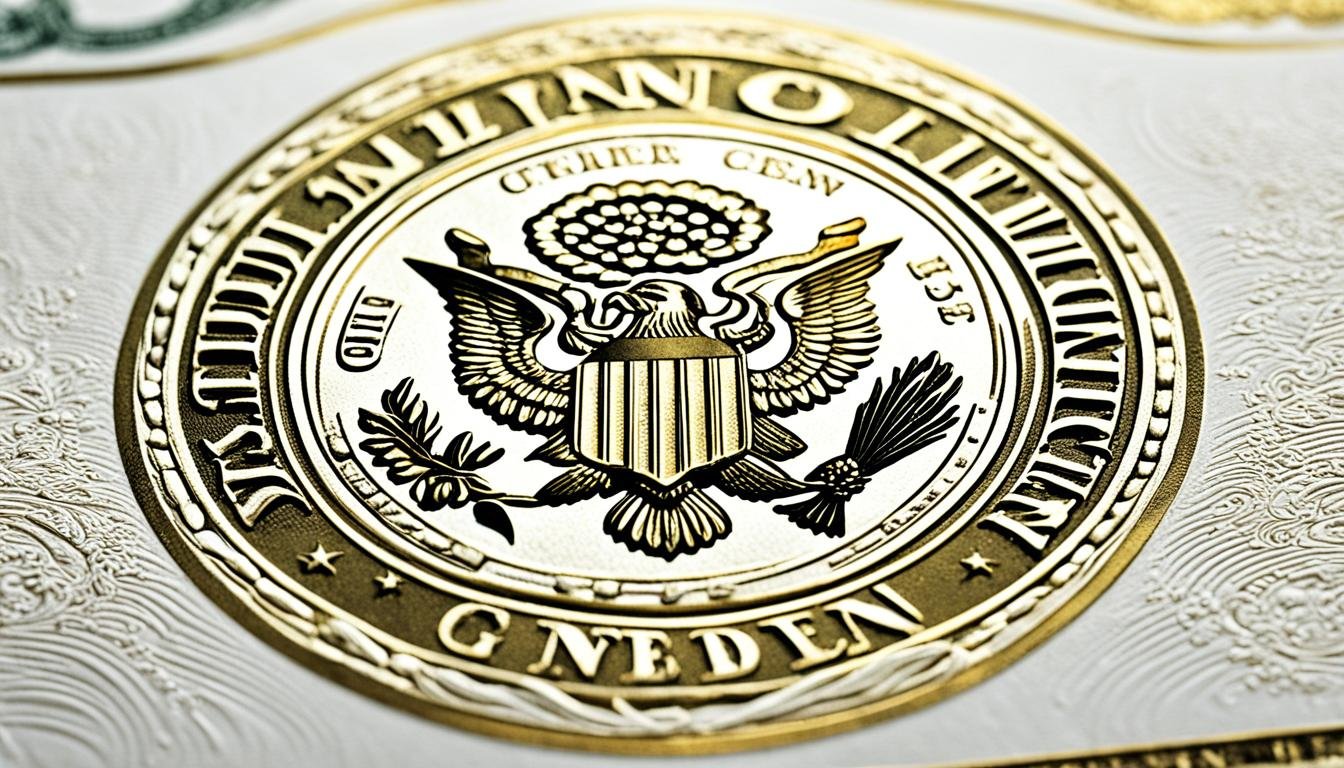Investing in gold and precious metals as a hedge against inflation
Gold and precious metals are often seen as safe havens against inflation’s impact. They are trusted because gold can increase in value while the dollar’s purchasing power drops. This makes gold a popular choice for those looking to protect their wealth from economic uncertainty and currency devaluation.
However, not everyone opts for gold to safeguard their investments. Some may find U.S. Treasury bills more attractive because they are considered very secure and may offer better returns when inflation hits. For a balanced approach, some exchange-traded funds (ETFs) mix gold with Treasuries. This mix can be a good strategy for many investors.
Key Takeaways:
- Gold and precious metals are often seen as a hedge against inflation and economic uncertainty.
- Government bonds, such as U.S. Treasury bills, are viewed by some as a safer alternative due to their security and potential for higher rates during inflationary periods.
- Investing in certain exchange-traded funds (ETFs) that combine gold and Treasuries can offer diversification and potential benefits for investors.
- When considering gold and precious metals as inflation hedges, it’s important to carefully weigh the advantages and disadvantages of each option.
- Ultimately, the choice between gold, precious metals, and government bonds will depend on individual preferences, risk tolerance, and investment goals.
The Pros and Cons of Investing in Gold
Gold is often seen as a safe bet in the investment world. But, it does have its good and bad points. These should be thought about before diving in.
The Pros of Investing in Gold
- Historically Better Performance: Over time, gold has shown it can beat other precious metals in performance. This makes it draw a lot of interest from investors.
- Hedging against Inflation: Gold can help protect your wealth when inflation hits. Its value usually goes up as money buys less.
- Portfolio Diversification: Having gold in a mix of investments helps spread out risks and lowers the chances of huge losses.
There are many ways to invest in gold, each carrying its own benefits:
- Gold Bullion: Many choose to invest in physical gold like bars and coins. It offers a ‘real’ value that some find comforting.
- Gold Market Trends: Knowing current trends in the gold market is vital. It can guide your investment decisions wisely.
- Precious Metal Coins: Gold coins, and those made of other precious metals, are both a cool collection and an investment.
- Gold IRA: A gold IRA makes it possible to hold gold physically as part of your retirement savings.
- Gold Mining Stocks: By buying shares of gold mining companies, you get a spot in the gold market itself.
The Cons of Investing in Gold
Gold’s shine isn’t without its dim spots. It brings its own share of drawbacks and challenges:
- Price Volatility: Gold prices can change a lot, meaning it might take a while to see a return on your investment.
- Timing the Market: Evidence suggests people often come into gold when it’s expensive. This can limit their earnings.
- Logistical Complexities: Storing physical gold safely can be hard and pricey. It’s not as easy as buying and holding stocks.
- Tax Implications: Owning gold may lead to tax issues. It’s important to understand these before investing.
Choosing to invest in gold depends on many factors. It’s wise to look at your goals, how much risk you can handle, and the current market.
The Uncertain Future of Gold
“Gold has historically outperformed other precious metals. But, whether it will keep doing so is anyone’s guess.”
An Image Illustrating Gold Bullion
Gold bullion is a physical option for those aiming to invest in gold. The picture above highlights why gold is prized – its lasting value and beauty.
The Case for Treasuries as an Inflation Hedge
Treasury bonds, like Treasury Inflation-Protected Securities (TIPS), are a good choice for people who want safe investments. TIPS help protect your money from losing value due to inflation. They keep up with inflation, so your investment stays valuable over time.
One big plus of government bonds is the promise you’ll get back your initial money. Buying Treasury bonds means you know you’ll get your money back later. This makes them great for people who want to keep their money safe.
TIPS are also good for those worried about prices going up. As inflation rises, so does the value of TIPS, protecting you from losing buying power. This means TIPS can keep your money real during uncertain economic times.
But, TIPS usually pay less interest than some other investments. This might not be great for investors who need regular money from their investments. Plus, remember that you’ll need to pay tax on the interest you earn from TIPS.
“TIPS offer investors a unique opportunity to protect their investment against inflation while enjoying the safety of government-backed securities.”
Still, TIPS are a good pick for those worried about inflation’s impact. They offer downside protection, are backed by the government, and give you your money back with interest. All this makes them a strong choice for careful investors.
Advantages of Treasury Inflation-Protected Securities (TIPS)
- Protection against inflation: TIPS offer a shield against inflation’s effects on your purchasing power.
- Guaranteed return of principal: You can trust that when TIPS mature, you’ll get back your initial investment.
- Backing of the U.S. government: The full faith and credit of the U.S. government supports Treasury bonds, which is comforting for those playing it safe.
Disadvantages of Treasury Inflation-Protected Securities (TIPS)
- Lower interest rates: TIPS often pay less than some other securities, which might reduce income for certain investors.
- Taxable events: Any interest you earn from TIPS is taxable, marking something to keep in mind for your financial planning.
Thinking about Treasury bonds in the fight against inflation involves knowing your financial goals and risk comfort. While TIPS safeguard against inflation and offer government security, they might not be the best for consistent income. It’s important to review your investment goals thoroughly to create a diverse portfolio for your future finances.

The Role of ETFs in Gold Investing
Exchange-traded funds (ETFs) are key for people wanting to invest in gold easily. They are a great option over actual gold. That’s because you don’t have to worry about storing or moving it.
These funds work just like stocks and bonds. This makes it simple for anyone to trade them on the stock market. You get to invest in gold without having to deal with the actual metal. Many investors love this about gold ETFs because it helps diversify their investments.
Different gold ETFs use different strategies. Some invest in gold bullion directly so you can follow gold prices closely. If you want your investment to shadow gold’s performance, these are a good choice.
Then, there are ETFs targeting gold mining companies. These allow you to invest in the gold market by looking at how well mining stocks do. It’s a way to possibly benefit from the industry’s success.
“Gold ETFs provide a convenient way for investors to gain exposure to gold without the logistical challenges of owning physical gold.”
It’s good to know that gold ETFs are taxed like normal stocks. You might have to pay taxes when you sell them and make a profit. Talking to a tax expert or financial advisor can help you understand more about these taxes.
Gold ETFs are a smart and flexible choice for adding gold to your investments. Whether you choose bullion or mining stocks, they open a door to gold’s value and potential growth.
Evaluating the Advantages and Disadvantages of Gold and Treasuries
Gold and Treasuries both protect against inflation but also have drawbacks. Let’s examine the upsides and downsides.
Advantages of Gold:
Gold is known for safeguarding against a weak currency, inflation, and uncertain economies. It’s a popular choice when markets are unpredictable. Its value moves independent of stocks and bonds, which can help balance an investment mix.
Disadvantages of Gold:
The value of gold can wildly vary, meaning one needs patience to earn from it. Many jump in when gold prices are high, potentially limiting gains. Plus, safely storing gold and dealing with taxes can be a hassle.
Advantages of Treasuries:
Treasuries, including government bonds, offer safe, guaranteed returns. Particularly in inflation, they keep up the real value of your money. TIPS specifically guard against inflation, maintaining the investment’s buying power.
Disadvantages of Treasuries:
Though safe, TIPS pay less interest, which might not suit those needing regular income. Also, getting a coupon from Treasuries is taxable, which could dent your overall gains.
In conclusion, gold and Treasuries each have strong points and drawbacks for fighting inflation. Gold can grow in value, offers diversity, and protects against economic troubles. Treasuries provide guaranteed profits, are steady during inflation, and safeguard against price rises with TIPS. Your choice between the two will depend on what you value, your risk tolerance, and your investment aims.
| Advantages of Gold | Disadvantages of Gold |
|---|---|
| Ability to hedge against currency devaluation, inflation, and economic uncertainty | Fluctuating prices that require patience to realize profits |
| Low correlation to stocks and bonds, providing diversification benefits | Logistical complexities such as storage needs and potential tax implications |
| Advantages of Treasuries | Disadvantages of Treasuries |
|---|---|
| Guaranteed return on investment | TIPS usually pay lower interest rates |
| Reliable source of income during inflationary periods | Taxable events associated with coupon interest payment |
Conclusion
Investors are looking at gold and Treasuries to protect themselves from inflation in the market. Gold always stood as a shield against inflation. It’s a good choice, but can be shaky and hard to predict. Treasury bonds, on the other hand, promise a safe return and defense from inflation via TIPS. Sadly, they might not offer the best profits for investors.
Deciding between gold and Treasury bonds depends on what you value. Some people like gold because it’s real and can deal with tough times. Others choose Treasury bonds for their safety and reliability.
A mixed portfolio with both gold and Treasuries is a smart move. This strategy brings together the good points of each investment. It helps lower the risk and pushes towards financial goals over time.







